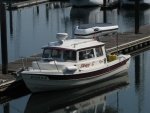A question that comes to mind when reading your mission post is.... do you need or want a trailerable boat? If I lived in the PNW, had a family of four, and my goal was to cruise locally (I include the Inside Passage to Alaska in "locally"), then perhaps a larger, displacement cruiser would be more comfortable and enjoyable.
I like having my trailerable, but on the other hand, if you don't really use that feature, then a trailer is just one more thing to maintain, and a tow vehicle (if you don't already have one) another thing to buy and maintain. Of course if you do trailer actively, there is no substitute.
There is the middle ground of a "transportable boat" that you trailer home (or hire it done) once per year for at-home storage and puttering (Nordic Tug 26, for example).
So as mentioned above, I don't see it so much as a thing about being a first time boater, as I do about use-case scenario. You can get into plenty of trouble in a canoe, so small size doesn't necessarily mean safety. Where the bigger boat can "get you" is in systems/maintenance/complication/stress (these things stress some folks but not others).
I had some customers who were first time boaters and went with a 44' trawler. Their feeling was, "we are getting into this later in life and don't have time to work our way up through the years with small-medium-large boats." That might make an old salt cringe, but they were actually really thorough people (he had been a pilot, which also helps) and they took courses and plus hired a captain for on-the-water training in their specific boat. They were methodical and conscientious. They started with the boat in a slip, and practiced and made forays to work their way into it. They also had the budget to simply pay for maintenance and repairs, and had no plans to go "foreign" or to far flung places (where it's even more important to be able to do it yourself).
Did all of that completely make up for being an old salt? No, but then everyone with a car is not Mario Andretti either. They were not the types that made me feel, "Let me know when you plan to be out on the water so I can stay far away." I'd rather share the water with them than a group of beer-soaked lifetime boaters with eyes glue to the chartplotter (or worse). So I mean, I think there's room for you on the water for sure. Come on in!

Sounds like you are conscientious and methodical, and I think that's an important trait. You likely won't be cocky.
Welcome, and I hope you find your "just right" boat :thup

